
Posted on : July 17th, 2025
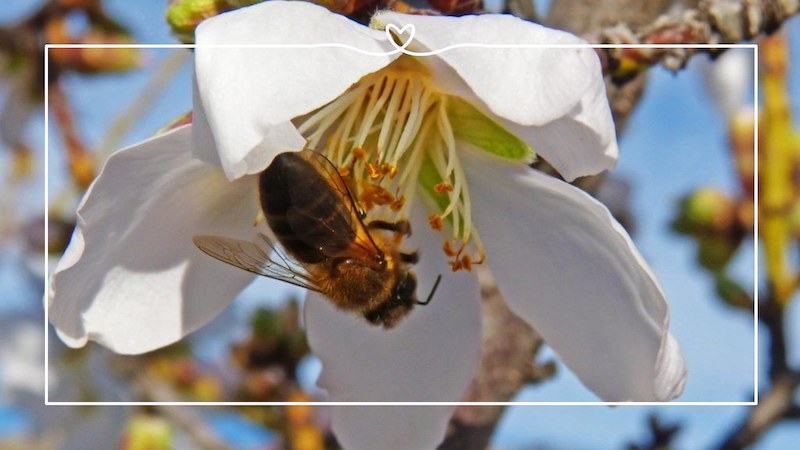
If you’ve ever enjoyed a spoonful of Maisie Jane’s almond butter, you’ve already experienced a little sunshine: creamy, clean, and crafted from California-grown almonds. But what if we told you that every delicious bite is also helping save the bees?
That’s not just marketing fluff. It’s a real, intentional part of how we farm, produce, and do business.
Here’s the buzz: bees are in trouble, and so is the entire ecosystem that depends on them—including your favorite nut butters, fruits, and garden blooms. But there’s good news, too, you have more power than you think.
At Maisie Jane’s, we’ve always believed in doing things the right way. We support local hives, embrace bee friendly farming, and work hand-in-hand with nature instead of against it. We strive to produce real food with a real purpose and couldn’t do it without the help of our pollinator friends.
So, if you’ve ever wondered how to help bees, without becoming a beekeeper yourself, this is for you. Get an insider’s look at what we call “Bee-Proactive” farming and better understand the wonders of honeybees and their native cousins, the threats they face, and the big and small ways you can support pollinator health, just by choosing better snacks!
Before we dive into farming practices, let’s pause for a moment to appreciate the main character of this story. Bees are some of the most fascinating, hard-working creatures on the planet who often are neglected the respect they deserve.
We all know the honeybee, but did you know it’s just one of 20,000 bee species? From the fuzzy Native American bumble bee to the sleek, Yellow-faced Hawaiian bee, each has its own role in keeping ecosystems alive and thriving.
These tiny insects aren’t just buzzing around for fun, but rather they’re essential workers. The pollinating ability of the honeybee alone supports 80 percent of flowering plants globally. From apples and berries to the almonds we lovingly harvest here at Maisie Jane’s, bees play a role in bringing you the food on your plate.
And while honeybees are the best-known pollinators, many California native bees and other bees native to North America outperform them when it comes to certain plants. Some are specialists who have co-evolved with specific crops and excel in pollination, and their loss has a big ripple effect.
Not at all! While honeybees are prized for their sweet golden nectar, most wild bees don’t produce honey. Nor do they live in large hives, either. But what they do offer is just as sweet: the vital pollination work that keeps ecosystems balanced and blooming.
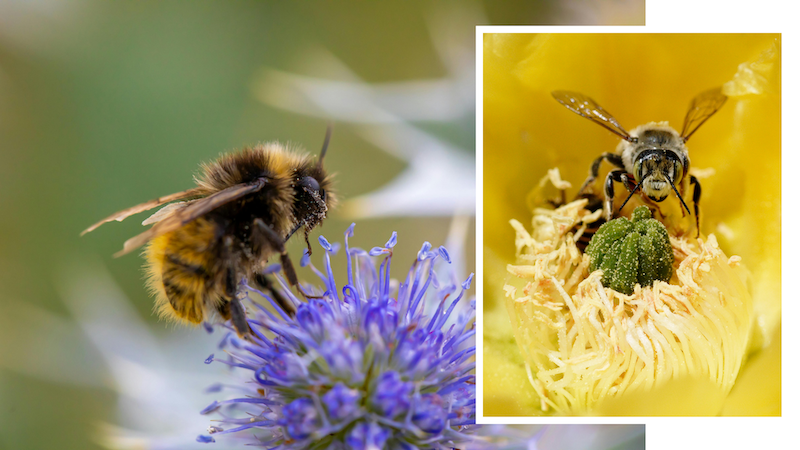
It’s easy to assume the bee population is thriving, especially when you’re dodging the flying insects in your garden or shooing them away from your almond butter toast. Truth be told, bee populations are dwindling, and a number of species are now considered endangered. This isn’t just a loss for the bees. It’s a loss for biodiversity, food security, and disrupts the future of farming itself.
Bee health is complex—and so are the challenges they face. The phenomenon known as Colony Collapse Disorder (CCD) first made headlines over a decade ago, when beekeepers reported sudden, devastating hive losses. Adult worker bees were going missing outside the hive, leaving queens and young bees behind with no way to survive.
Although CCD cases have become less common in recent years, the broader issue of pollinator decline remains.
Research points to a number of overlapping threats to bee health:
And while honeybees receive much of our attention, let’s not forget native and wild bees such as the California Bumble Bee and Yellow-Faced Hawaiian Bee who face similar challenges without the benefit of human intervention.
No bees would mean the loss of a significant pollinator. The delicious almonds, apples, avocados, cucumbers, berries, or tomatoes you love would all be impacted.
In short, losing bees would mean a shortage of much of the food we rely on, especially the most nutritious and flavorful parts of our diets.
And the threat extends beyond crops. Bees play a critical role in maintaining healthy ecosystems by supporting plant reproduction and biodiversity. When they disappear, entire food chains begin to unravel.
The good news? We know more about how to help bees than ever before, and a growing number of farmers, researchers, and conscious consumers (like you) are stepping up to take action.
At Maisie Jane’s, we’ve made bee protection part of our farming DNA, and we’re not alone. Across the country, people are planting wildflowers, avoiding harmful pesticides, supporting regenerative farms, and choosing bee friendly brands that prioritize the planet over profit.
Together, we’re creating a future where bees can thrive and where your next snack can be both delicious and impactful!
At Maisie Jane’s we don’t manage our own hive, but we do believe in the value of building partnerships with people who care as much about bees as we do. That’s why we work with the Zitlaw brothers, local beekeepers who manage the hives that help pollinate our almond orchards.
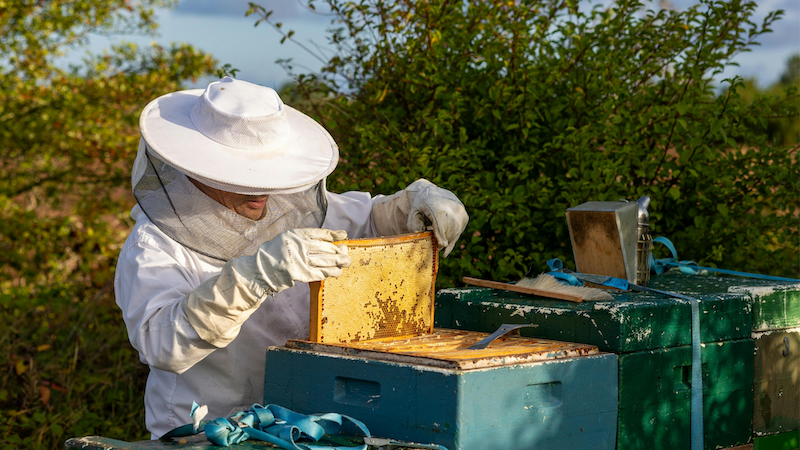
We recently had a chance to chat with Greg Zitlaw, who shared his passion, insights, and a glimpse into the world of beekeeping:
“I’m a beekeeper because I sincerely enjoy working with bees,” Greg says. “They are fascinating insects both as individuals and as a colony.”
Greg and his brother started their business in 2007, returning to their agricultural roots after growing up on a family almond orchard. Today, they manage 300 hives across Northern California—from Red Bluff to Paskenta—moving hives seasonally for pollination and queen bee sales.
When asked what fascinates him most about bees, Greg shared:
“The simple fact that 30,000 individual bees can work together in such unity and harmony… That amazes me.”
He explained the three roles in a hive. There are drones (males), worker bees, and queens—all of which require intense management to keep hives healthy.
“The biggest struggle with beekeeping is controlling a bee pest called varroa,” Greg explains. “It’s a mite that feeds off the bee’s hemolymph (bee blood), weakening the bee and causing it to die prematurely.”
Despite the challenges, Greg says the most rewarding part is queen rearing. He takes pride in helping build the next generation of healthy colonies.
And his advice to consumers?
“Don’t be afraid of bees. They are so busy doing their job and will ignore you if you simply observe them and appreciate them.”
We take pride in partnering with local beekeepers such as Greg who teach proper bee edict, since that’s exactly what we aim to do here at Maisie Jane’s. You can check out the Zitlaw’s Facebook for more on ethical beekeeping and queen rearing practices. With bees in danger, we believe it’s our responsibility to treat them with the respect and care they deserve, recognizing they’re vital to the entire planet.
Protecting pollinators isn’t a side mission at Maisie Jane’s, it’s how we farm.
Through what we call “Bee-Proactive” practices, we’ve designed every part of our process—from orchard to jar—to help bees thrive while delivering the clean, delicious nut products you love.
Here’s how your almond butter habit makes a real difference.
Our almonds and bees are partners in a beautiful cycle. Almond trees are not self-pollinating—they depend entirely on bees to blossom into the almonds you enjoy in our nut butters and snacks. And in return? Almond flowers provide an early-season feast for bees, filled with nectar and pollen they desperately need after winter.
It’s truly an incredible relationship. When we care for the bees, we yield better crops. When we grow our crops sustainably, the bees get a safer world to thrive in.
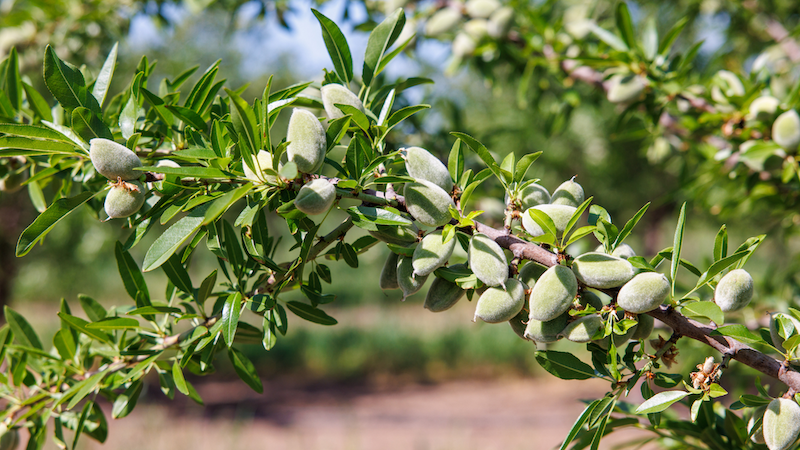
We practice Bee Friendly Farming every step of the way:
These practices don’t just help the bees—they reduce the need for synthetic inputs, support soil health, and help create a more resilient farming ecosystem.
Our commitment goes even deeper. We’re proud to support regenerative agriculture, a holistic approach that builds soil health, improves biodiversity, and actively restores ecosystems. For every 12oz. jar of Maisie Jane’s Almond Butter sold, we donate 5% of proceeds directly to bee research and outreach.
We’ve partnered with:
These aren’t just donations—they’re long-term partnerships that support scientific research, habitat creation, and real-world solutions.
You’ll never find palm oil in our nut butters. Why? Because palm oil production is one of the leading causes of deforestation, which destroys natural bee habitats around the world.
By saying no to palm oil, we protect tropical ecosystems, promote sustainable sourcing, and offer you a cleaner, better product with zero compromises.
From our local almond orchards to our peanut-free processing facility, everything we do is rooted in intentionality, food-security, and mindfulness. You’ll always know where your food comes from and how it’s made, because your peace of mind is as important to us as our pollinators’ wellbeing.
When you support Maisie Jane’s, you’re not just choosing clean, delicious food—you’re becoming part of a bigger solution. And that makes your next snack a whole lot sweeter.
We talk a lot about how important bees are to us, but what about what’s important to them?
To thrive, bees need more than blooming trees and good weather. They need healthy habitats, a diverse bee diet, and safe, pesticide-free environments where they can perform their pollenating duties best.
At Maisie Jane’s, we’re working to create those conditions in our orchards every day. But there’s plenty you can do too—right in your backyard, on your balcony, or even just through the brands you support.
Just like us, bees need a balanced diet. Flowers provide the optimal nutrients for bees, making them the perfect plants to support a healthy hive.
Honeybee food includes nectar (carb source) and pollen (protein). The more diverse their forage, the better. That’s why we plant flower mixes and native plants throughout our property and along our creek-side borders, giving both honeybees and California native bees access to the nutrients they need year-round.
When natural food sources dwindle, beekeepers like the Zitlaw brothers supplement with corn syrup and pollen patties. But in a thriving ecosystem, nature provides everything bees require.
Ever wonder how many bees are in a hive? A single hive can hold up to 60,000 bees during peak season. That’s 60,000 tiny workers, each playing a role in keeping our food system alive.
We support these super colonies by maintaining healthy beehives and giving them safe places to forage. We call them bee pastures. These are areas filled with wildflowers, native plants, and undisturbed grasses that assist in bee survival.
Bee-friendly pastures:
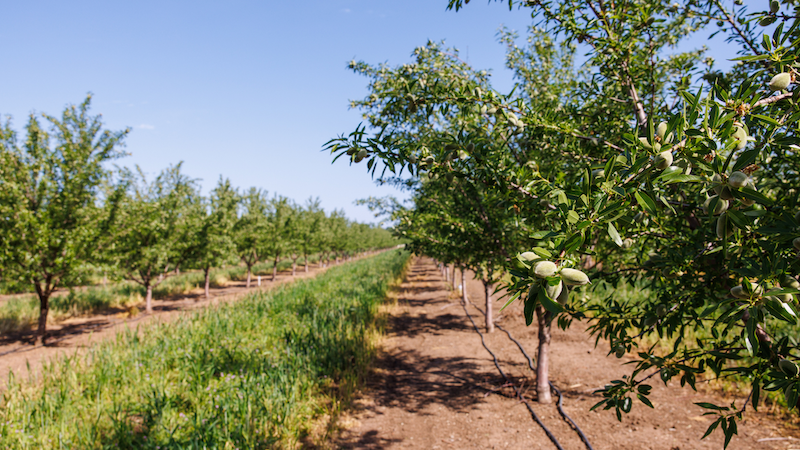
Whether you have a backyard garden or a windowsill of herbs, every effort counts. You don’t have to be a beekeeper to make a difference—just someone who’s willing to think a little deeper about the impact of your choices.
So, if you’ve ever wondered how to help bees, here are a few meaningful ways to start today:
If you’re wondering how to attract bees to your space, start with your plants.
Planting bee friendly plants like lavender, sunflowers, sage, mint, and wildflowers gives pollinators the nectar and pollen they crave. Additionally, think beyond spring. Plant a mix of blooms that flower across seasons, giving bees food year-round. Choosing plants that are bee friendly and native to your region will make your garden a true haven for local pollinators.
Even better? You can skip the chemicals. Eco-friendly landscaping means ditching synthetic pesticides and opting for bee friendly pesticides. These are natural treatments that don’t harm pollinators or disrupt ecosystems.
Like all creatures, water is necessary to a bee’s diet. Providing safe access to water such as placing stones in a shallow dish of water makes for easy take-off and landing. This helps prevent bees from drowning and encourages hydration in the summer heat.
This is eco-friendly landscaping at its best—beautiful, balanced, and buzzing with life.
Of course, not everyone has room for a pollinator garden. That’s where your purchasing power makes a huge difference.
Support brands that prioritize pollinators and sustainability. Look for:
Every time you choose consciously, you’re casting a vote for a food system that’s better for the ecosystem and for your health. Bees may be tiny, but they depend on big-picture thinking. Maisie Jane’s is proud to support the cause and delighted to have customers who feel the same.
Maisie Jane’s Honey is harvested with the same care and values we apply to everything we make—sourced locally, minimally processed, and packed with golden sweetness straight from healthy hives.
Every jar supports responsible beekeeping, helps sustain pollinator populations, and pairs perfectly with your morning toast or a swirl into your favorite almond butter. It’s the easiest way to bring your love for bees to the breakfast table.
Knowledge is power and the more we know, the more we can do to help the bees.
We believe at Maisie Jane’s that when you’re bee-educated, you’re better equipped to make choices that truly matter. Every bee-friendly snack, organic jar of almond butter, and pesticide-free flower helps build a world where pollinators can prosper.
When you choose Maisie Jane’s, you’re not just buying nut butter. You’re making small, mindful choices that will positively impact your health and that of our ecosystem.
You’re investing in:
You’re choosing to eat better and live more consciously. Supporting Maisie Jane’s is partnering with a company that’s deeply rooted in the health of our planet—and the tiny pollinators that help keep it alive.
Shop our bee-friendly almond butters and nut snacks
Enjoy free shipping on orders $79+
Know that every purchase helps protect pollinators and support bee research